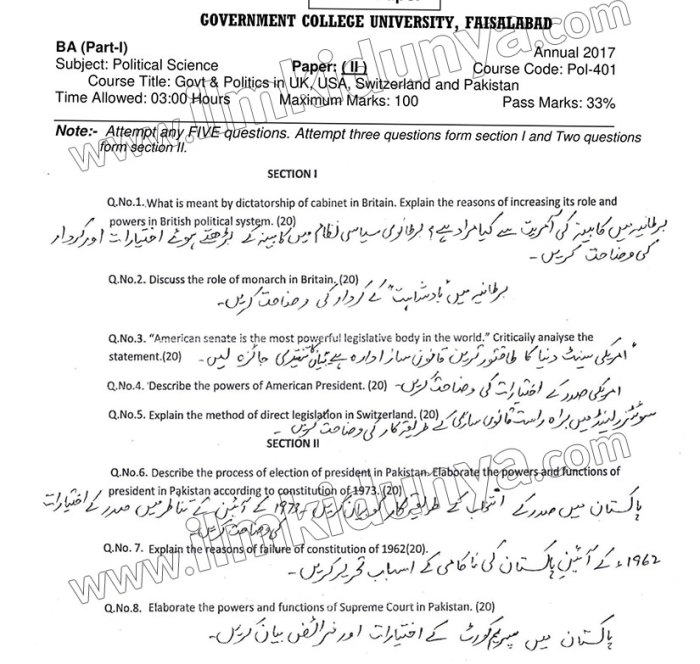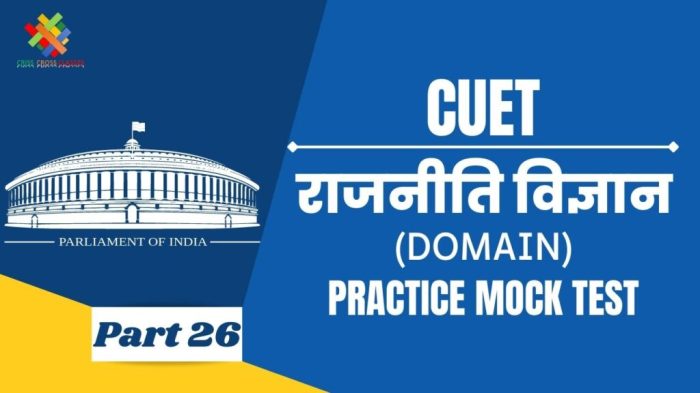Embark on a journey of political science mastery with the FBLA Political Science Practice Test, an indispensable tool for students seeking to excel in their academic pursuits. This comprehensive guide delves into the intricacies of political science, empowering learners with a profound understanding of its fundamental concepts, theories, and applications.
Prepare to navigate the complexities of American government and politics, unravel the dynamics of international relations, explore comparative political systems, and delve into the realm of political thought. With each question and answer, you will sharpen your analytical skills, enhance your knowledge, and build confidence in your ability to tackle any political science challenge.
Political Science Overview
Political science is the systematic study of politics, power, and government. It examines the institutions, processes, and behaviors that shape the distribution and exercise of power in society.
Political science is a vast and interdisciplinary field that encompasses a wide range of subfields, including:
Subfields of Political Science, Fbla political science practice test
- Comparative politicscompares political systems and institutions across different countries and regions.
- International relationsstudies the interactions between states and other actors in the global arena.
- Political theoryexamines the fundamental concepts and principles of politics, such as power, justice, and legitimacy.
- Public administrationfocuses on the management of public organizations and the implementation of public policy.
- Public policyanalyzes the development, implementation, and impact of government policies.
Real-World Applications of Political Science
Political science has a wide range of real-world applications, including:
- Policy analysis: Political scientists help governments and other organizations to develop and evaluate public policies.
- Political consulting: Political scientists advise candidates and political parties on campaign strategy and public opinion.
- International relations: Political scientists work for governments and international organizations to promote peace and cooperation.
- Public administration: Political scientists manage public organizations and implement public policy.
- Teaching: Political scientists teach at universities and colleges, helping students to understand the political world.
American Government and Politics

The United States government operates on a system of checks and balances, with power divided among three branches: legislative, executive, and judicial. This structure is designed to prevent any one branch from becoming too powerful.
The legislative branch is responsible for making laws. It is composed of the House of Representatives and the Senate. The House of Representatives is made up of 435 members, each representing a district within a state. The Senate is made up of 100 members, two from each state.
Roles of Different Branches of Government
The executive branch is responsible for carrying out the laws. It is headed by the president, who is also the commander-in-chief of the armed forces. The president appoints members of the cabinet, who lead different departments of the government.
The judicial branch is responsible for interpreting the laws. It is composed of the Supreme Court and lower federal courts. The Supreme Court is the highest court in the land, and its decisions are binding on all other courts.
Electoral Process and Political Parties
The electoral process is the system by which people choose their representatives in government. In the United States, elections are held at the local, state, and federal levels. The most important election is the presidential election, which is held every four years.
Political parties are organizations that work to elect candidates to office. The two major political parties in the United States are the Democratic Party and the Republican Party.
International Relations

International relations encompass the interactions between sovereign states and other international actors, such as intergovernmental organizations and non-governmental organizations. It is a complex and dynamic field that involves a wide range of issues, including diplomacy, security, economics, and human rights.
Key Concepts and Theories
There are a number of key concepts and theories that underpin the study of international relations. These include:
- Sovereignty: The concept of sovereignty refers to the idea that states are independent and have the right to govern themselves without external interference.
- National interest: The national interest is the set of goals and objectives that a state pursues in its foreign policy.
- Power: Power is a key concept in international relations. It can be defined as the ability to influence the behavior of others.
- Interdependence: Interdependence refers to the interconnectedness of states and other international actors. This interconnectedness can be economic, political, or social.
The Role of International Organizations
International organizations play a vital role in international relations. They provide a forum for states to cooperate on a variety of issues, including security, economics, and human rights. Some of the most important international organizations include the United Nations, the World Bank, and the International Monetary Fund.
Causes and Consequences of Conflict and Cooperation
Conflict and cooperation are two of the most important dynamics in international relations. Conflict can occur for a variety of reasons, including territorial disputes, ideological differences, and economic competition. Cooperation, on the other hand, can occur when states share common interests or when they are faced with a common threat.
The consequences of conflict and cooperation can be far-reaching. Conflict can lead to war, economic instability, and human suffering. Cooperation, on the other hand, can lead to peace, prosperity, and human development.
Comparative Politics: Fbla Political Science Practice Test
Comparative politics examines the similarities and differences between political systems around the world. It analyzes the structures, institutions, and processes that shape political outcomes in various countries. By comparing different political systems, we can gain insights into the factors that influence political development and the challenges and opportunities of democratization.
Comparing Political Systems
Political systems vary widely across countries. Some of the key dimensions used to compare political systems include:
- Type of government (e.g., democracy, autocracy, monarchy)
- Structure of government (e.g., federal, unitary, parliamentary, presidential)
- Electoral system (e.g., first-past-the-post, proportional representation)
- Party system (e.g., one-party system, two-party system, multi-party system)
- Role of the military (e.g., civilian control, military rule)
Factors Influencing Political Development
Political development refers to the process by which a country’s political system evolves over time. Several factors influence political development, including:
- Economic development
- Social and cultural factors
- Historical experiences
- International influences
Challenges and Opportunities of Democratization
Democratization is the process by which a country transitions from an authoritarian regime to a democratic one. It presents both challenges and opportunities. Challenges:
- Consolidating democratic institutions
- Overcoming authoritarian legacies
- Addressing economic and social inequalities
Opportunities:
- Increased political participation and accountability
- Improved human rights and freedoms
- Enhanced economic growth and stability
Political Thought
Political thought encompasses the study of fundamental principles and theories that shape political systems and ideologies. It explores the nature of power, authority, justice, and the role of individuals and institutions in society.
Political thought has been influenced by historical and contemporary thinkers, including Plato, Aristotle, Machiavelli, Locke, Marx, and Weber. These thinkers have proposed various ideologies, such as liberalism, conservatism, socialism, and fascism, which have shaped political discourse and practice.
Major Political Ideologies
- Liberalismemphasizes individual rights, limited government, and free markets.
- Conservatismvalues tradition, order, and limited social change.
- Socialismadvocates for social equality, collective ownership of resources, and government intervention in the economy.
- Fascismpromotes nationalism, authoritarianism, and the suppression of dissent.
Influence of Historical and Contemporary Thinkers
Plato’s theory of the ideal state, Aristotle’s concept of citizenship, and Machiavelli’s analysis of power have had a profound impact on political thought. Contemporary thinkers, such as John Rawls, Amartya Sen, and Martha Nussbaum, have contributed to the development of theories on justice, equality, and human rights.
Relationship between Political Thought and Practice
Political thought provides the theoretical underpinnings for political practice. It influences the development of constitutions, laws, and policies, and guides the actions of political leaders and citizens. However, political practice can also shape political thought, as real-world experiences and events can lead to the re-evaluation and modification of existing theories.
Research Methods in Political Science
Political science research involves systematic methods to gather and analyze data about political phenomena. Researchers employ diverse methodologies to understand political processes, institutions, and behavior.
Data collection methods include surveys, interviews, experiments, and observational studies. Surveys gather information from a sample of individuals, while interviews provide in-depth perspectives from specific individuals. Experiments manipulate variables to test hypotheses, and observational studies examine real-world phenomena without direct intervention.
Data Analysis
Data analysis involves statistical techniques to identify patterns, relationships, and trends in the data. Quantitative methods use numerical data to test hypotheses and draw inferences, while qualitative methods analyze non-numerical data to understand subjective experiences and meanings.
Ethical Considerations
Political science research must adhere to ethical guidelines to protect participants’ rights and ensure the integrity of the research process. Informed consent, confidentiality, and protection from harm are paramount. Researchers must also consider the potential impact of their findings on society and avoid biased or misleading conclusions.
FAQ
What is the purpose of the FBLA Political Science Practice Test?
The FBLA Political Science Practice Test is designed to provide students with an opportunity to assess their knowledge and skills in political science, identify areas for improvement, and enhance their preparation for the actual exam.
What topics are covered in the practice test?
The practice test covers a wide range of topics in political science, including American government and politics, international relations, comparative politics, and political thought.
How can I use the practice test effectively?
To use the practice test effectively, it is recommended to simulate real exam conditions by setting a timer and completing the test in one sitting. Review your answers thoroughly, identify areas where you need improvement, and focus on strengthening your understanding of those concepts.
